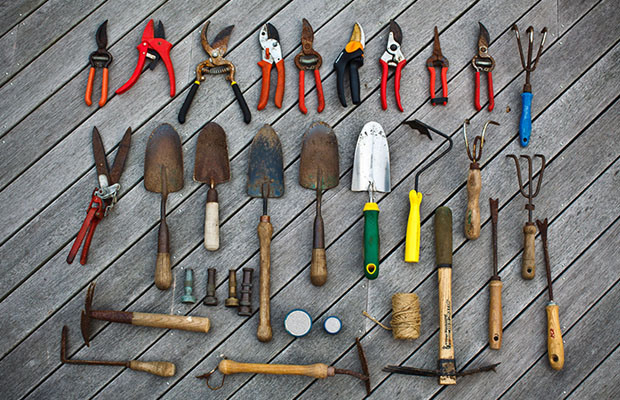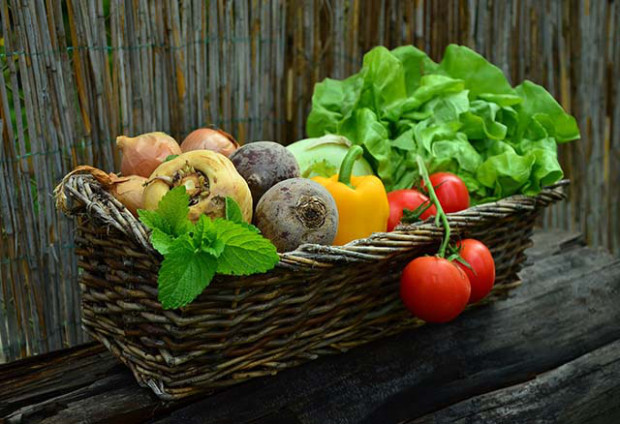Editor’s Note: This post has been generously contributed by Caitlyn Robinson.
It’s not a secret that self-reliance plays an essential role in a SHTF scenario. Besides the basic knowledge about making a fire and a shelter, purifying water and dressing wounds, you also have to make sure you have an ample supply of food. Canned beans and frozen meat are bound to run out sooner or later. And if you’d like a side dish with fresh game, you’d better draw-up a checklist of all the essential garden tools you need for a vegetable garden. Tending a small crop sounds daunting, but, in fact, it can be pretty easy once you get the hang of it and you grasp the essential things. Backyard farming might involve a lot of early mornings and hard work, but it’s a gift that keeps on giving. And if our ancestors aced it, we can do it too. Keeping a vegetable garden in tip-top shape will require a wide range of essential garden tools. Get some inspiration from the list of tools we’ve compiled for the beginner prepper who wants to grow his own tomatoes and cilantro.
Hand rake
You’ve got plenty of hand rakes to choose from. As long as it feels comfortable and sturdy, a hand rake will help you easily clear any type of debris around your plants and vegetables. With lengths that vary from 3-15 inches, hand rakes are adjustable and can come in handy for more than just cleaning your flower beds.
Water breaker
Vegetables will need a lot of water to grow and become plump and tasty. For a gentle, daily irrigation you can choose a water breaker that is suitable for mature plants and flowers. They’re convenient, easy to use and can even be safely handled by children helping out with household chores.
Shears
If you’re a novice to gardening, you might not know that grass and shrubs will grow everywhere and will take over fragile plants if they are not trimmed in time. This is where shears come in handy. Designed to cut tough shrubs as well as leather and other fabrics, shears will be useful in gardening chores and around the house for cutting cables or boxes.
Hand pruners
There’s a lot of cutting involved in gardening. Plant’s thickness directly influences the tool you need. To tackle branches that don’t exceed three-fourths of an inch, you’ll need a hand pruner. This tool has very sharp blades and will easily cut through anything.
Footwear
Never do any gardening chores in your everyday shoes. They’re bound to get dirty and damaged in addition to failing terribly at keeping your feet dry. To make sure you feel comfortable and feel free to step in puddles and mud, choose a pair of rubber boots. They also double as rain boots, they’re comfortable and extremely easy to clean and dry. Don’t shy away from investing in a more expensive pair that will stand the test of time and safely get you through all seasons.
Gardening gloves
A pair of high quality gardening gloves is a must both for newbies and seasoned gardeners. These will keep your hands protected and won’t allow thorns to pierce through. Depending on how much gardening work you plan to do, you can choose between a really light weight pair or a thicker, heavy duty set. You’ll figure out what you need once you start working and get some hands-on experience. Stubborn bushes will require a solid pair of gloves, while handling more delicate plants a simple cotton pair will suffice.
Gardening aprons
We’re used to associate aprons with the kitchen and cooking, but their use is much more extensive than that. Gardening aprons have a self-explanatory purpose: they protect clothes from dirt, mud and water, but they also come with plenty of pouches and pockets. These are very useful for carrying around seeds, small tools, protection glasses and garden twine. You can even use them to hold your keys and phone, as long as they’re secured with a zipper or button, to prevent accidentally losing them among plants.
Wheelbarrow or cart
You might not need this straight away, but you’ll start wishing you had one as your workload increases. Wheelbarrows or carts will come in handy for moving waste, bringing in compost, taking shrubs or trees from one place to another, taking large quantities of ripe vegetables from the garden into the house and carrying around equipment. Besides being very helpful in your vegetable garden, these tools will prove to be of service on other household chores as well.
Garden pegs, fleece and twine
These bits and pieces might be small, but they’ll help any beginner prepper keep his garden in tip-top shape. Pegs will prove useful for securing nets or lines to the ground. Fleece is generally used for protecting the plant from freezing overnight in spring time. And, finally, twine is very versatile and will have a use in most of your gardening activities, such as tying plants to stakes.
Other criteria to consider before starting planting seeds:
- Sun exposure. Second to water, Sun is the best friend of vegetables. They need at least six hours of Sun exposure every day to thrive. When you choose the spot for your vegetable garden, factor in Sun exposure and go for a spot that won’t be shadowed by buildings or trees throughout the day.
- Soil types. Your vegetables won’t be able to grow in any given kind of soil. Find out what you’re dealing with by using a soil test it and, if it is the case, enrich it with compost.
- Seeds and water. Research different types of seeds to know what’s suitable for the area where you live and prepare to take good care of them. Vegetables will need plenty of water daily, so if there’s not enough rain, you’re going to have to step in and water them yourself.
- Placement and size. As a rule, it’s better not to place your vegetable garden next to a tree, which will steal all the nutrients your veggies need and cast a shadow on the plot. When you’re considering the size of your backyard farm, take into consideration that a 16 x 10 feet garden will be enough for a family of four during summer time and still offer plenty for canning.
Author bio: Caitlyn Robinson is an avid gardener who has developed a passion for organic food and products. She is a strong believer in self-sufficiency and an even stronger advocate for environmentally friendly choices. As an informal gardening expert, when she’s not cooking the vegetables she grows herself, she collaborates with online blogs to spread her agrarian knowledge.
If you found this article useful, please Vote for The Prepper Journal as a top prepper web site.
Copyright Information This information has been made available by The Prepper Journal. Content on this site (unless the work of a third-party) may be shared freely in digital form, in part or whole, for non-commercial use with a link back to this site crediting the author. All links in articles must remain intact as originally posted in order to be republished. If you would like to be notified of new articles, contests and Prepper news, please sign up for our daily newsletter.











Thanks for putting together this list of tools! My personal most important is a good pair of gardening gloves. I’ve got two: a heavy duty pair for pulling ivy, bindweed, and anything with thorns, and a more rubbery pair for things like planting.
I had to tackle an overgrowth of ivy once and my rubber gloves got pulled to pieces! So I had to get some heavy duty gloves and they did a much better job.
What would be your tool that you couldn’t live without?